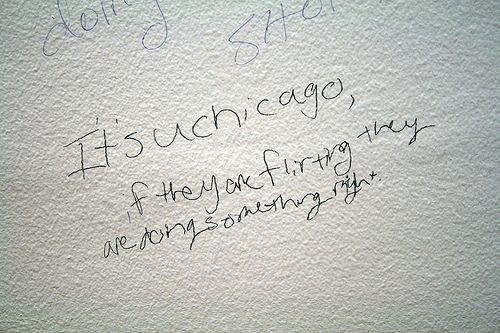Do Pretty Women Cause Men's Mouths To Water? Courting Behavior Spikes Testosterone In Saliva, Study Finds

To all the slack-jawed, incredulous men of the world, hear this: science knows why you're drooling over the woman who just walked by. Research from the University of Chicago shows that when a man is attracted to a woman, his saliva production increases and contains greater traces of testosterone.
Published the journal Evolution and Human Behavior, the study examined the ways in which heterosexual students in their 20s interacted with the opposite sex. When men made small talk with other men, the testosterone levels in their saliva remained unchanged. When they interacted with women, however, their salivary testosterone levels spiked dramatically. The team credited this spike to the men's desire to court the woman, as testosterone often accompanies such behavior.
The students involved with the study ranged in age from 21-31. In total, 39 people participated. Also involved in the study were five women, all of whom were preselected and aware of the study's purpose. They ranged in age from 19-23. Before each conversation, the men had their mouths swabbed for testosterone samples.
In just five minutes, the men's levels of testosterone changed dramatically.
Especially apparent were the changes among men who tried to impress their female conversation partners. Dr. James Roney, who at the time of the study worked at the Institute for Mind and Biology at the University of Chicago, was the lead researcher.
"I would not say that the men were actually drooling but there were significant changes to their saliva. After these conversations with the women, they showed a major testosterone increase," Roney said.
Moreover, the greater the male's attraction felt by the woman, the more the testosterone the researchers found in the men's saliva. At the end of the study, the men were given a short quiz to rate any attraction levels between them and the women.
"The degree of change was associated with the extent to which the girls thought they were interested in them as romantic partners or trying to show off," Roney added.
The women were also asked to describe their impressions of the conversation and whether they thought the man was trying to impress them. The researchers then cross-referenced the men's responses with the women's, and then compared testosterone levels against both.
Their findings led them to the conclusion that "these behavioral ratings, in turn, were correlated with the participants' ratings of the female confederates as potential romantic partners," the team noted. "Results were generally consistent with the hypothesis that human males may exhibit a behavioral and endocrine courtship response that is similar to that observed in males of many nonhuman vertebrate species."
Source: Roney J, Mahler S, Maestripieri D. Behavioral and hormonal responses of men to brief interactions with women. Evolution and Human Behavior. 2003.
Published by Medicaldaily.com



























